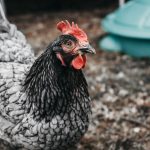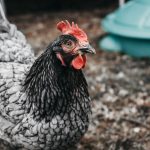Chickens have specific requirements for cold weather survival. Understanding these needs is essential for maintaining the health and welfare of a flock during winter. While chickens are generally resilient, they can be affected by cold temperatures.
As temperatures decrease, chickens need additional care to stay warm and healthy. Chickens are more vulnerable to drafts and dampness than to cold temperatures alone, making proper shelter and insulation crucial for their comfort and safety in winter. Proper nutrition and hydration are also vital for chickens in cold weather.
Lower temperatures increase chickens’ energy requirements as they work to maintain body heat. Providing a high-quality, nutrient-dense feed is necessary to keep the flock healthy during winter. Ensuring access to clean, unfrozen water is critical to prevent dehydration and maintain overall health.
By addressing these specific cold weather needs, chicken owners can take appropriate measures to ensure their flock remains healthy and comfortable throughout the winter season.
Table of Contents
- 1 Providing proper shelter and insulation for chickens
- 2 Adjusting feeding and watering routines for cold weather
- 3 Maintaining good ventilation in the chicken coop
- 4 Protecting chickens from frostbite and other cold-related health issues
- 5 Providing supplemental heat for chickens in extreme cold
- 6 Monitoring and observing chickens for signs of distress or illness
- 7 FAQs
- 7.1 What are the best ways to keep chickens laying in cold weather?
- 7.2 How can I keep my chicken coop warm in cold weather?
- 7.3 What should I feed my chickens to help them lay in cold weather?
- 7.4 Do chickens need additional light in the winter to keep laying?
- 7.5 How can I prevent my chickens’ water from freezing in cold weather?
Key Takeaways
- Chickens need extra care in cold weather to stay healthy and comfortable
- Proper shelter and insulation are essential for protecting chickens from the cold
- Adjust feeding and watering routines to ensure chickens have enough energy and hydration
- Good ventilation in the coop is crucial to prevent moisture buildup and maintain air quality
- Protect chickens from frostbite and other cold-related health issues by providing adequate care and attention
- Supplemental heat may be necessary in extreme cold, but should be used with caution
- Regular monitoring and observation of chickens is important to identify any signs of distress or illness early on
Providing proper shelter and insulation for chickens
Insulating the Coop
The chicken coop should be well-ventilated to prevent the buildup of moisture and ammonia, but it should also be free from drafts and leaks. Insulating the coop can help maintain a comfortable temperature inside, while also preventing drafts and moisture buildup. This can be achieved by adding insulation to the walls, ceiling, and floor of the coop.
Bedding and Shelter
Additionally, providing plenty of bedding, such as straw or wood shavings, can help keep the coop warm and dry. In addition to proper insulation, providing adequate shelter is crucial for protecting chickens from the elements.
Additional Tips for Winter Comfort
This can include adding windbreaks or tarps to the outside of the coop to block cold winds, as well as ensuring that the coop is free from leaks and drafts. Providing roosting bars for the chickens to perch on can also help keep them off the cold ground and provide additional warmth. By providing proper shelter and insulation, you can help ensure that your chickens stay warm and comfortable throughout the winter months.
Adjusting feeding and watering routines for cold weather

Feeding and watering routines should be adjusted to meet the specific needs of chickens in cold weather. As mentioned earlier, cold temperatures can increase the energy requirements of chickens as they work to maintain their body temperature. This means that providing a high-quality, nutrient-dense feed is essential for keeping your flock healthy during the winter months.
In addition to their regular feed, you may also consider supplementing their diet with scratch grains or other high-energy treats to help them stay warm. When it comes to watering routines, it’s important to ensure that your chickens have access to clean, unfrozen water at all times. This may require checking their water supply multiple times a day and using heated waterers or adding hot water to their waterers to prevent freezing.
Dehydration can be a serious issue for chickens in cold weather, so it’s crucial to take the necessary steps to ensure that they have access to clean water at all times. By adjusting feeding and watering routines to meet the specific needs of chickens in cold weather, you can help ensure that your flock stays healthy and well-nourished throughout the winter.
Maintaining good ventilation in the chicken coop
Maintaining good ventilation in the chicken coop is crucial for preventing moisture buildup and ensuring that the air inside the coop remains fresh and clean. While it’s important to keep the coop free from drafts, it’s equally important to ensure that there is adequate airflow to prevent the buildup of moisture and ammonia. This can be achieved by providing vents near the top of the coop to allow warm, moist air to escape, while also ensuring that there are no drafts near the floor where the chickens roost.
In addition to vents, it’s important to regularly clean the coop to remove any built-up droppings or bedding that can contribute to moisture buildup and ammonia levels. This can help maintain a healthy environment for your chickens and prevent respiratory issues that can arise from poor ventilation. By maintaining good ventilation in the chicken coop, you can help ensure that your flock stays healthy and comfortable throughout the winter months.
Frostbite is a common issue for chickens in cold weather, particularly on their combs, wattles, and feet. To protect your flock from frostbite, it’s important to provide adequate shelter and insulation, as well as ensuring that they have access to dry bedding and roosting bars to keep them off the cold ground. Additionally, applying petroleum jelly or other protective ointments to their combs and wattles can help prevent frostbite in extreme cold.
In addition to frostbite, chickens are also susceptible to respiratory issues in cold weather due to poor ventilation or moisture buildup in the coop. Keeping the coop clean and well-ventilated can help prevent respiratory issues, while also ensuring that your chickens have access to fresh air and clean bedding. It’s also important to monitor your flock for signs of illness or distress, such as lethargy, coughing, or sneezing, and seek veterinary care if necessary.
By taking the necessary steps to protect your flock from frostbite and other cold-related health issues, you can help ensure that they stay healthy and comfortable throughout the winter months.
Providing supplemental heat for chickens in extreme cold

Safety Precautions When Using Heat Lamps or Radiant Heaters
In extreme cold temperatures, providing supplemental heat may be necessary to keep your chickens warm and comfortable. This can be achieved by using heat lamps or radiant heaters in the coop, but it’s important to use caution when using these devices to prevent fire hazards or burns.
Ensuring Adequate Ventilation and Monitoring for Overheating
It’s also important to ensure that there is adequate ventilation when using supplemental heat to prevent moisture buildup and respiratory issues. When providing supplemental heat, it’s important to monitor your flock for signs of overheating or stress, such as panting or lethargy.
Having a Backup Plan for Power Outages or Equipment Failures
Additionally, it’s important to have a backup plan in case of power outages or equipment failures that could leave your flock without heat. By providing supplemental heat in extreme cold temperatures, you can help ensure that your flock stays warm and comfortable throughout the winter months.
Monitoring and observing chickens for signs of distress or illness
Monitoring and observing your chickens for signs of distress or illness is crucial for ensuring their health and well-being in cold weather. This can include regularly checking their behavior, posture, and overall condition for any signs of stress or illness. It’s important to pay attention to their eating and drinking habits, as well as their activity level and interaction with other flock members.
In addition to regular observations, it’s important to handle your chickens regularly to check for any signs of injury or illness, such as frostbite or respiratory issues. By being proactive in monitoring and observing your flock, you can identify any potential issues early on and take the necessary steps to address them before they become more serious. In conclusion, understanding the specific needs of chickens in cold weather is crucial for ensuring their health and well-being throughout the winter months.
By providing proper shelter and insulation, adjusting feeding and watering routines, maintaining good ventilation, protecting them from frostbite and other cold-related health issues, providing supplemental heat when necessary, and monitoring them for signs of distress or illness, you can help ensure that your flock stays healthy and comfortable during the colder months.
If you’re looking for tips on keeping chickens laying in cold weather, you might want to check out this article on PoultryWizard.com. It offers valuable advice on how to ensure your chickens continue to lay eggs even during the winter months. Additionally, PoultryWizard.com is a great resource for all things poultry-related, including information on breeding turkeys and their mating season here.
FAQs
What are the best ways to keep chickens laying in cold weather?
To keep chickens laying in cold weather, it’s important to provide them with a warm and dry coop, plenty of food and water, and additional light if necessary.
How can I keep my chicken coop warm in cold weather?
You can keep your chicken coop warm in cold weather by insulating the walls and roof, using a heat lamp or heated waterer, and providing plenty of bedding for the chickens to nest in.
What should I feed my chickens to help them lay in cold weather?
To help chickens lay in cold weather, it’s important to provide them with a balanced diet that includes plenty of protein and calcium. You can also supplement their diet with mealworms or other high-protein treats.
Do chickens need additional light in the winter to keep laying?
Chickens may need additional light in the winter to keep laying, as the shorter days can affect their egg production. You can use a timer to provide them with a few extra hours of light each day to encourage laying.
How can I prevent my chickens’ water from freezing in cold weather?
To prevent your chickens’ water from freezing in cold weather, you can use a heated waterer or add a small amount of apple cider vinegar to the water to lower its freezing point. You should also check the water regularly and break up any ice that forms.
Meet Walter, the feathered-friend fanatic of Florida! Nestled in the sunshine state, Walter struts through life with his feathered companions, clucking his way to happiness. With a coop that’s fancier than a five-star hotel, he’s the Don Juan of the chicken world. When he’s not teaching his hens to do the cha-cha, you’ll find him in a heated debate with his prized rooster, Sir Clucks-a-Lot. Walter’s poultry passion is no yolk; he’s the sunny-side-up guy you never knew you needed in your flock of friends!







